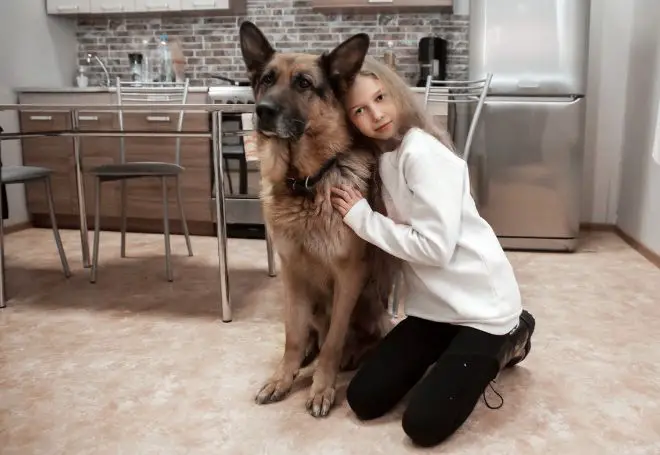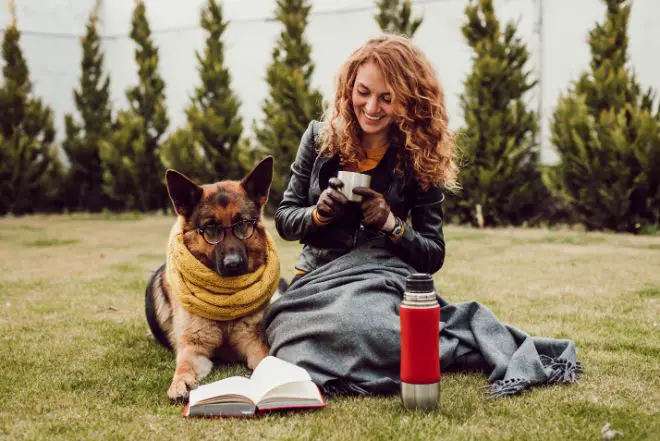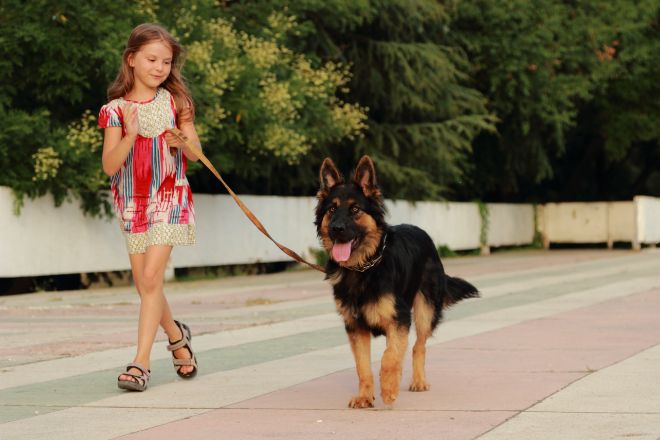This guy had to leave his dog, a German Shepherd, at home while on assignment. He’d been away from Freya for months, and they may have had late-night Skype conversations to catch up, but despite the appearance of her owner, Freya knows it isn’t the real thing.
When the moment came for Freya’s human to return home, his family realized what needed to be done. They placed him behind the door and activated the camera because their connection is so strong that they knew there would be some sort of altercation, and they were not incorrect!
Freya, a German Shepherd, is reunited with her owner in this lovely video after several months apart. Just listen to those joyful cries!
Are German Shepherds Prone To Separation Anxiety?
German Shepherds can be prone to separation anxiety, but not all of them are. Some dogs may become anxious when their owners leave because they become lonely or bored. Others may have been bred to be protective of their families and may see their owners’ departure as a threat.
If your dog seems to have separation anxiety, there are a few things you can do to help him or her feel better. First, make sure you’re leaving your dog with plenty of toys and chews to keep him occupied. You can also try training your dog to stay in a designated spot until you return (like his crate or bed). If your dog is particularly anxious, you might also want to consider using a pheromone diffuser, which can produce calming pheromones that will help keep your dog relaxed.

Do All German Shepherds Have Separation Anxiety?
All German Shepherds with separation anxiety will show some signs of this condition, which may include excessive barking, whining, destructiveness when left alone at home, and/or vomiting.
What many people do not realize is that dogs live in the “here and now” rather than dwelling on worrisome thoughts about potential threats that might or might not occur in the future. The most common triggers for dog-related separation anxiety may be variations in experience (e.g., changes to your routine), food quality, changes to their physical environment (e.g., new kids moving into your house) or even simply being left with a family member other than their humans while everyone else disappears for more than about thirty minutes or so without warning them, and without giving them a chance to get used to the idea gradually.
How Do I Stop My German Shepherd From Having Separation Anxiety?
There are a few things you can do to help reduce your German Shepherd’s separation anxiety. One is to make sure you provide plenty of exercise and stimulation when you’re home, so she doesn’t get antsy and start to bark or whine. You can also try leaving a radio or television on when you’re gone, to provide some background noise. And finally, it’s important to create a positive association with being left alone by gradually increasing the amount of time you’re away, and providing lots of treats and praise when you return.

Do German Shepherds Have Bad Anxiety?
German Shepherds are prone to anxiety for a few reasons. They are bred as working dogs and love companionship, so if they’re left alone for long periods of time or don’t get along with other pets in the home, they can become anxious. Additionally, German Shepherds are particularly prone to noise anxiety, which can cause them to bark excessively or even become destructive.
How Do I Know If My German Shepherd Has Anxiety?
If your German Shepherd’s anxiety is mild to moderate, they may show similar symptoms as a human with depression. For example, the changes in their appetite and sleep patterns, loss of interest in their favorite activities, weight gain or weight loss from being inactive, becoming clingy around you [the owner] and emotionally unstable when meeting or confronted by strangers. Also noticeable are their tendency to bark excessively because of an increase in fearfulness.
The more severe case will overwhelm them mentally- making them behave strangely-disorientation which can be seen through night terrors or overreacting too quickly to perceived threats are just two examples he may have difficulty coping with changing environments or routines set by themselves or their owners which ultimately leads to distress.

How Long Should German Shepherds Be Left Alone?
A German Shepherd can be left alone for a few hours with no problem, but a higher degree of caution should be used if he’s 8 months old or younger. Activity level is also an issue, for example if the dog is used to playing outside all day long then he requires more attention than that of a house-dog. At 3 years old, you need not worry that much about the demeanor of your pet at home. It’s best to ask yourself how active your dog was when you leave so you’ll know better what to expect. Larger breeds shouldn’t go more than 18 hours without being let out because they could have an accident or start breaking things around the house in order to get out.
Why Is My German Shepherd So Attached To Me?
Because she loves you.
A dog will redirect their anger or frustration to a person they have a lot of trust in – not just because it’s safer for them, but also because they know that this would be better for them too. They’re social creatures and instinctively want to be with the one providing their daily needs. Dogs bond almost immediately at birth and will sense when something is amiss if they are separated from the one who provides good care for them.
Her love of you doesn’t mean she’s smarter than other dogs – all dogs are capable of feeling deep emotions including sadness, anger, joy, pain and empathy just like humans do.”

What Dog Breed Is Most Likely To Have Separation Anxiety?
There are many dog breeds that have been shown to be more susceptible to separation anxiety. Some of these include, but are not limited to, shih tzus, yorkies and corgis. Some other breeds that may be at a higher risk for this behavior include siberian huskies and australian shepherds.
Separation anxiety is an issue we see in many dogs when they’re left alone in the home or yard without adequate exercise, mental stimulation and social contact with humans or pets during their waking hours. This condition may be worsened by early maternal deprivation such as poor mothering skills on the part of the dam or lack of attention from owners who work away from home all day long leaving little time to spend with their pet.
How To Treat My German Shepherd’s Separation Anxiety?
If your dog shows signs of separation anxiety, you should consult a trainer or behaviorist to properly diagnose the issue and determine whether or not there is an underlying cause such as a phobia.
It’s also important to remove any environmental stimuli that may be causing anxiety in your dog so they can relax and take their mind off the stress. You should spend time with them daily by going on a walk together and playing some fetch.

Are German Shepherds Ok To Be Left Alone?
This is a difficult question in that there are many factors that can come into play.
Factors in consideration in this question: the temperament of the pet, how long will they be alone, what is their owner’s schedule when he/she is home, do they have any separation anxiety. Furthermore, if they have been left alone before or not and with how much success? In general, I would advise against leaving an animal unattended for very long periods of time without having discussed what you’ll do with them with your veterinarian ahead of time.
Do Puppies Grow Out Of Separation Anxiety?
It’s possible, but not always.
Puppies can outgrow separation anxiety if it’s mild and not caused by a traumatic event, such as being abandoned or rehomed. However, if the anxiety is severe or is caused by a traumatic event, it may be more difficult for the puppy to overcome. In some cases, medication or therapy may be necessary to help the puppy overcome his anxiety.